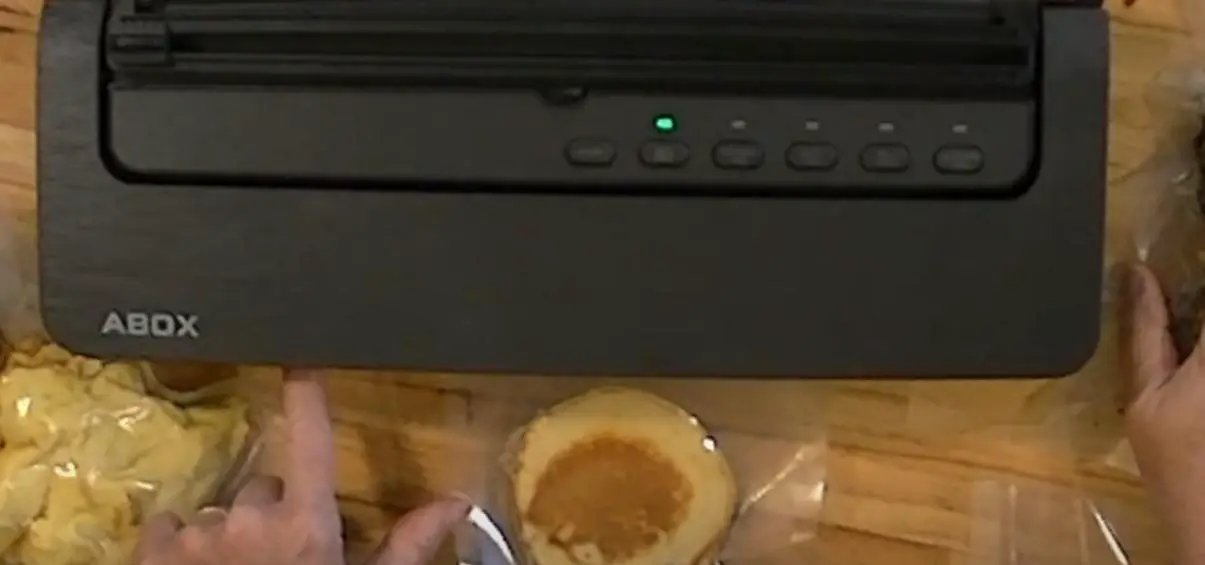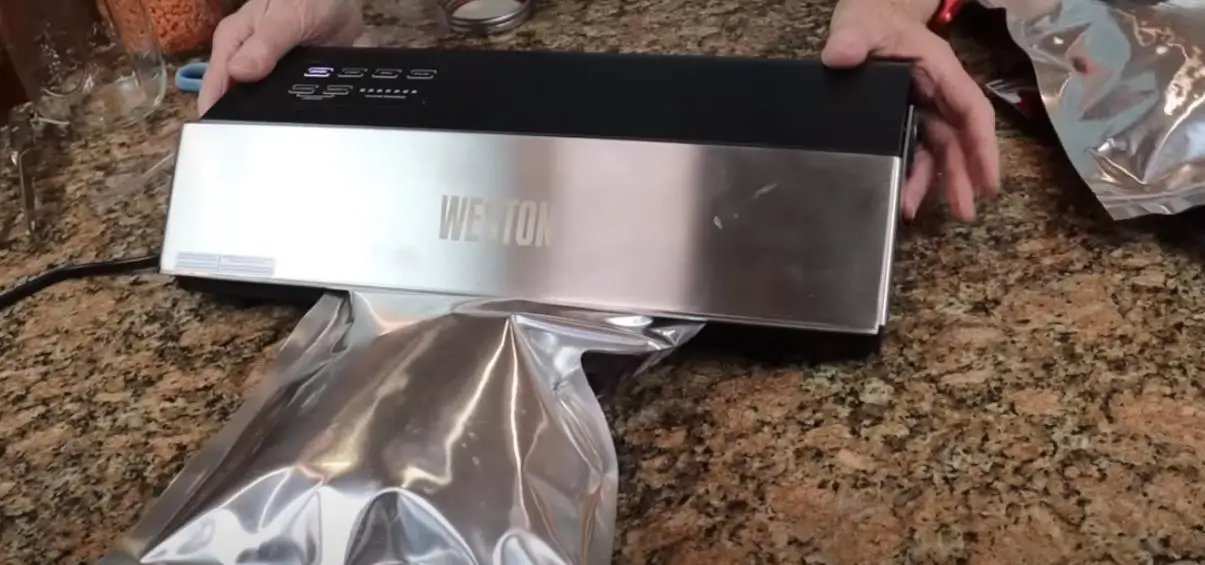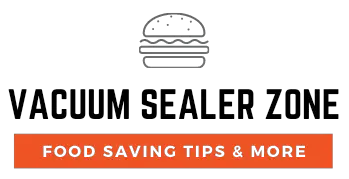Key Takeaways
- You can vacuum seal cooked food as long as it is at least room temperature.
- The vacuum helps food last longer by inhibiting bacterial growth.
Have you ever had a meal that was so good, you wished you could have it again? Well, now you can with vacuum sealing!
Vacuum-sealing cooked food is a great way to preserve your meals and enjoy them later.
Not only does it prevent freezer burn, but it also keeps your food fresh and tasty.

Can you vacuum-seal cooked food? What are the benefits of doing so?
When it comes to vacuum sealing, there are many benefits that can be had by doing so – especially when it comes to cooked food. For one, vacuum sealing can help to preserve food for a longer period of time by inhibiting the growth of bacteria.
Additionally, vacuum-sealed foods tend to retain their flavor and freshness better than those that are not sealed – making them ideal for leftovers or meal prep.
But how exactly does one go about vacuum sealing cooked food? The process is actually quite simple and only requires a few steps.
First, make sure that your cooked food is cooled completely before attempting to seal it. If it is still warm, the heat will cause the bag to expand and may prevent a proper seal from forming.
Once cooled, simply place the food in a freezer bag and use your vacuum sealer according to the manufacturer’s instructions. That’s all there is to it!
So if you’re looking for a way to extend the shelf life of your cooked meals or want an easy way to meal prep, give vacuum sealing a try.
How long does vacuum-sealed cooked food last? Is it safe to eat after a certain amount of time?
Vacuum-sealed cooked food can last for a significantly longer period of time than non-sealed food – often up to a year or more. However, once a vacuum-sealed package has been opened, it should be eaten within five days.
This extended shelf life is due to the fact that vacuum sealing removes air from the packaging. This lack of oxygen prevents bacteria from growing and spoiling the food.
Additionally, it stops moisture from evaporating, which can cause foods to become dry and unappetizing.
So if you have some cooked foods that you want to save for later, seal them up tightly! Just be sure to eat them within a few days after opening the package.
What foods should you not vacuum seal? Why can’t some foods be sealed using this method?
If you’re looking to extend the shelf life of your food, vacuum sealing can be a great option. But there are some foods that don’t do well when sealed in this way. Here’s a look at some of the foods you should avoid vacuum sealing, as well as why they don’t work well with this storage method.
Soft cheeses, raw onions and garlic, cruciferous vegetables, mushrooms, and freshly cooked food are all examples of foods that shouldn’t be vacuum sealed.
These foods are more likely to go bad when stored in an airtight environment. That’s because they continue to release gases as they decompose, which can cause the food to spoil more quickly.
So if you’re looking to keep these types of foods fresher for longer, it’s best to store them in a traditional manner – like in the fridge or freezer – rather than using vacuum sealing.
Can I vacuum seal and freeze cooked food?
You can vacuum seal and freeze cooked food without affecting the taste or texture of the dish.
This is a great way to meal prep or saves leftovers. When you reheat the food, it will taste just as fresh as when you first made it.
If I have leftovers, can I vacuum seal them and save them for later?
When it comes to leftovers, vacuum sealing is a great way to help extend their shelf life. This works for cooked food as well as flour, sugar, and other pantry staples. Some good examples of items that can be vacuum sealed are pasta sauce, Thanksgiving leftovers, and baked goods.
Vacuum sealing your food can help it last up to 5 times longer than if it were stored in a regular container. Not only does this mean you can save money by buying in bulk and storing those extra servings for later, but it also means less food waste overall.
Can you cook food in a vacuum-sealed bag?
Yes, you can cook food in a vacuum-sealed bag using the sous vide method. This is an effective cooking method that maintains the integrity of the food. To cook food in a vacuum-sealed bag, you will need to use a special device called sous vide machine.
This machine heats water and circulates it around the food in the bag. The circulating water ensures that the food cooks evenly and prevent it from drying out.
What are the best foods to Vacuum Seal and Freeze?
When it comes to preserving food, vacuum sealing and freezing are two of the most effective methods.
Vacuum sealing prevents air from coming into contact with food, which helps to prevent spoilage. Freezing also helps to preserve food by preventing bacteria from growing.
So, what are the best foods to vacuum seal and freeze? The answer may surprise you – almost any type of food can be preserved using these methods! However, there are some types of foods that work better than others.
Washed and dried fruits and vegetables are a great option for vacuum sealing and freezing.
Dehydrated fruit can also be stored in a vacuum-sealed bag – just make sure to add enough sugar or honey to prevent freezer burn.
Pre-freezing items on baking sheets before sealing them is also a good way to ensure that they stay fresh for longer periods of time.
Vacuum Sealing Food: The Pros and Cons
When it comes to storing food, there are many different options available. Vacuum sealing is one option that has both its pros and cons.
The biggest pro of vacuum sealing is that it can help extend the shelf life of food. This means that you can keep food fresh for longer periods of time, which can be very useful if you want to store perishable items for a longer period of time.
Additionally, vacuum-sealed foods often have less freezer burn than those stored using other methods.
However, there are also some drawbacks to vacuum sealing your food. One big downside is that it can be more expensive than other storage methods.
Additionally, while vacuum sealing is often effective at preventing freezer burn, it isn’t foolproof and sometimes food can still become damaged during storage.
Overall, vacuum sealing is a storage method that has its own advantages and disadvantages. It’s important to weigh these factors carefully before deciding whether or not this is the right option for you and your food storage needs.
Is It Safe To Reheat Vacuum-Sealed Foods?
Yes, you can safely reheat vacuum-sealed foods. There are a few methods to do so, including in the microwave, stovetop, or boiling water. When reheating, some people recommend cutting off a corner of the bag to allow steam to escape while others recommend leaving the bag intact and just cooking for longer.
Vacuum sealing is a great way to keep food fresh and extend its shelf life. But what about when you’re ready to eat? Is it safe to reheat vacuum-sealed foods?
The short answer is yes! You can safely reheat your vacuum-sealed leftovers using one of several methods: the microwave, stovetop, or boiling water. Just be sure to follow these guidelines:
For the microwave: Cut off a small corner of the bag before microwaving on 50% power for even heating. Alternatively, leave the bag intact and cook for slightly longer than normal. If using plastic wrap, make sure it’s labeled “microwave safe.”
For the stovetop: Simmer in hot water for 10-15 minutes (longer if frozen). Again, cut off a small corner of the bag if desired to release steam build-up during cooking.
In boiling water: Bring a pot of water to a boil then lower the heat slightly before submerging your food container (sealed side up!).

What Happens To Food When You Vacuum Seal It?
When you vacuum seal food, it deprives the food of oxygen that bacteria need to grow.
This extends the storage period for the food, allowing you to keep it fresh for longer.
Vacuum sealing is a great way to preserve your food and make sure it stays fresh.
Final Verdict
You can vacuum seal cooked food in order to keep it fresh and prevent it from spoiling. Vacuum sealing will also keep the food moist and tender.
